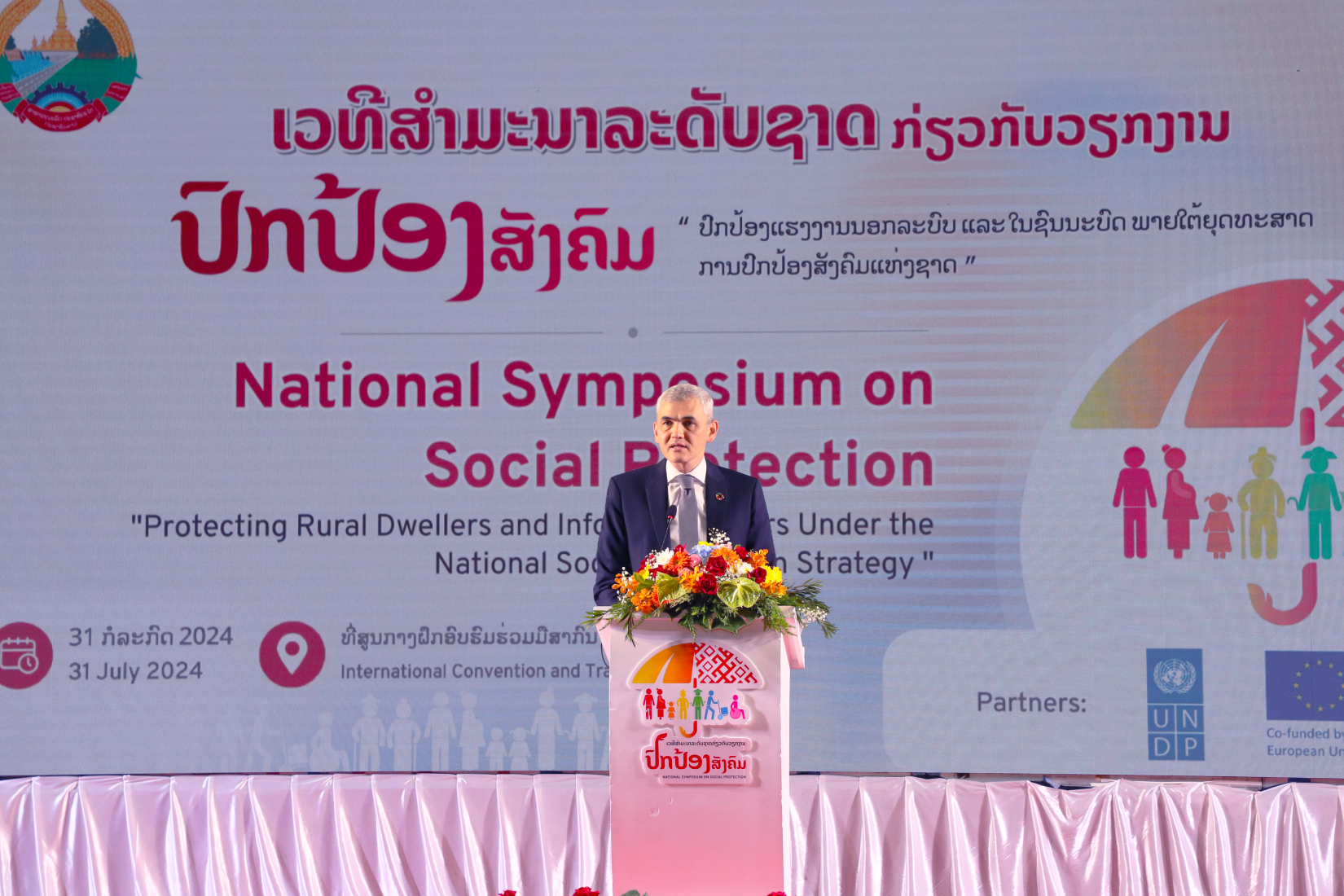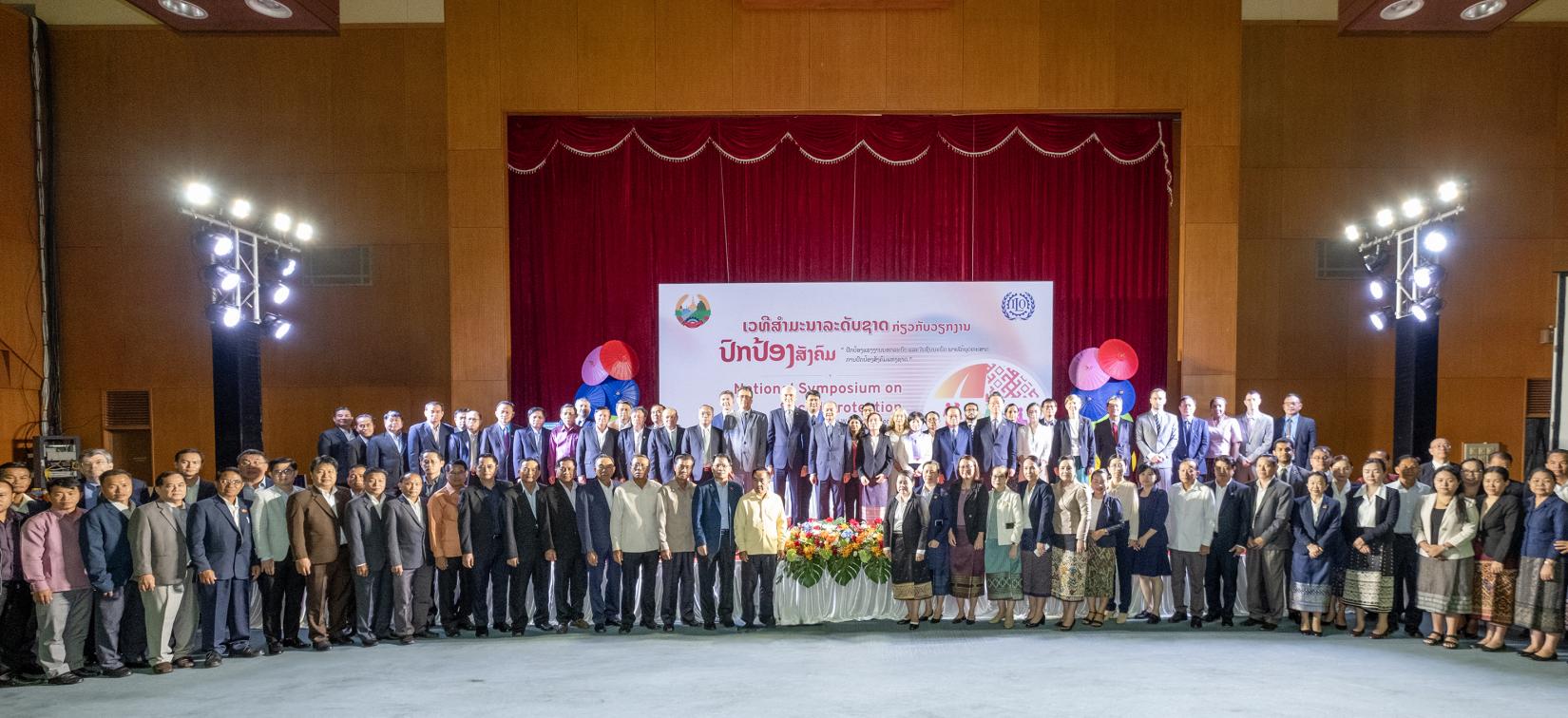National Symposium on Social Protection “Protecting Rural Dwellers and Informal Workers Under the National Social Protection Strategy”
Remarks by Bakhodir Burkhanov, UN Resident Coordinator

Excellency Dr. Kikeo Khaikhamphithoune, Deputy Prime Minister
Excellency Madam Baykham Khattiya, Minister of Labour and Social Welfare
Deputy Chairs of the National Social Protection Committee – Dr. Sanong Thongsana, Vice-Minister of Health and Dr. Soulidong Soundala, Vice-Minister of Education and Sports
Ms. Xiaoyan Qian, ILO Country Director
Esteemed partners from Government Ministries and Provinces
Excellencies Ambassadors and Development Partners
Ladies and gentlemen –
It is my honor and privilege to deliver remarks at the first-ever National Symposium on Social Protection in Lao PDR. I would like to take the opportunity to pay tribute to the Ministry of Labour and Social Welfare for its vision in organizing today’s symposium, and to the International Labour Organisation (ILO) and other partners, including the European Union, Government of China and UNDP, for their support.
It is wonderful to see such a large gathering of representatives across different sectors, which is crucial given the cross-cutting nature of social protection. All around the world social protection schemes have proven to be instrumental in reducing poverty and inequality, accompanying a person’s life journey from cradle to grave. Social protection truly cuts across the work of ministries, provinces and mass organizations present in this room today.
The global picture of progress on Sustainable Development Goals is very mixed. Many countries are seeing stagnation or reversal of hard-earned development gains. Lao PDR’s recent Voluntary National Review of SDG progress has put a spotlight on challenges as well as opportunities in the remaining years before 2030.
Regionally, it would take Asia and the Pacific up to 2062 to meet the SDGs at the pace we are going. Last year, Member States committed to accelerating and turbo-charging the SDGs – including through key transitions that can deliver catalytic and multiplier effects across several SDGs.
Jobs and social protection is one of the six SDG transitions. Indeed, social protection contributes to several SDG targets, such as 1.3 (social protection), 3.8 (universal health coverage), 5.1 (gender equality), 8.5 (decent work), and 10.4 (policies for greater equality). Initiatives such as the Global Accelerator on Jobs and Social Protection for Just Transitions, launched by the UN Secretary-General in September 2021, signal the UN System’s collective commitment to rescuing progress towards the SDGs by working with countries to create decent jobs and to extend social protection.
The UN Country Team in Lao PDR brings several UN agencies working on social protection together under the UN Sustainable Development Cooperation Framework 2022-26. These efforts are fully aligned with the Government’s national priorities and the 9th Socio-Economic Development Plan, and we have been a proud partner of the Government in the formulation of the National Social Protection Strategy and related initiatives.
The National Social Protection Strategy already sets the tone for how Lao PDR intends to ensure that by 2030, all Lao citizens have access to essential services. Framed around the pillars of health insurance, social security and social welfare, the strategy adopts a Leave No One Behind approach.
The most crucial element is perhaps financing of social protection. Data from 2018 shows that Lao PDR’s public spending on social protection is 1.6% of GDP – significantly lower than regional and global standards. Moreover, further disaggregation shows that the benefits of social protection are fragmented. According to ADB Update of Lao Social Protection Indicators (2023), the amount of social protection expenditure reaching the non-poor in 2018 was 0.78% of GDP per capita, compared to 0.07% reaching the poor. Women received a smaller proportion of social protection benefits at about 0.36% of GDP per capita, compared to 0.49% received by men. And people with disabilities received less social protection benefits at about 0.02% of GDP per capita, compared to 0.83% received by those not disabled. The data shows us that social protection is not only crucial in its comprehensive coverage, but also in targeting the desired end recipients.
It is important to note that this data pre-dates the introduction of the national health insurance scheme. However, the global crises, the COVID pandemic and the current macroeconomic instability in the country have delayed comprehensive action on the implementation of the national social protection strategy. It is urgent now to turn the strategy into action and to implement good practices as part of nation-wide schemes and programs.
One of the actions proposed in the Lao PDR Smooth Transition Strategy (STS) for LDC graduation, endorsed by H.E. the Prime Minister, is to review the implementation and funding of the National Social Protection Strategy. It aims to strengthen domestic financing for social protection, with a particular focus on enrolling women, children and vulnerable groups such as persons with disabilities, and on anticipatory action in preparation for the post-LDC era.
There are several good initiatives in the country and elsewhere on social protection that we will hear about in the course of today’s discussions. It is time to scale up, replicate and elevate the good practices, so that social protection becomes integral to the nation’s development agenda in its pursuit of improving the well-being of its citizens.
Moving forward, the Government of Lao PDR has signaled its increased recognition of social protection by reflecting it in Sector Working Group coordination mechanisms, paving the way for a more prominent placement of Social Protection in the new 10th National Socio-Economic Development Plan. The 10th NSEDP will take Lao PDR through to the SDG deadline of 2030. As such, its recognition of Social Protection as an accelerator of sustainable and equitable development would be an important building block for the country’s SDG ambition.
Let us take today’s symposium as a call for all of us to commit to building a financially sustainable, inclusive and robust social protection system in Lao PDR.
I wish us all successful deliberations today, producing tangible benefits to women, men and children of this country that we all serve.
Thank you, once again, for being part of this momentous occasion.


